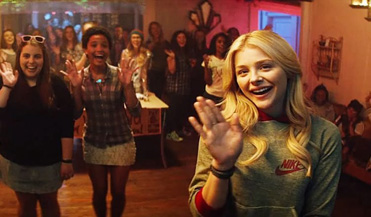|
|
Movie Review - Neighbors 2: Sorority RisingBy Ben GruchowMay 26, 2016
The humor, ostensibly the reason we're here, is generally more confident and less hyperactive than in the first Neighbors, and the first act in particular has a smooth, consistent rhythm to its punchlines and story beats that the rest of the film can't hope to live up to. Mac and Kelly's realtor, played by Liz Cackowski, is one of the biggest contributors to this despite a relative lack of screen time: her initial rundown of the Radners' selling situation, after they receive an offer, nails the right comic timing and intonation so precisely that it throws into sharp relief any other performer or moment that falls even a little short (Lisa Kudrow is mostly wasted in a one-scene reappearance as a politically-charged dean, although the offhanded way she intercepts a bribe offer from Kelly is worth a decent laugh; Kelsey Grammer doesn't even have that to claim, in a cameo as Shelby's frustrated father that makes use of precisely none of the actor's estimable gift for conveying frustration in a comic way). What Stoller has done here is crafted a sequel that aims higher in its observational prowess; there are enough sequels that don't even try for this, and enough sequels that try for it and fail entirely, that it's almost impossible to walk out of Neighbors 2 without some measure of kind and generous feeling toward it. It's not a bad film; there is storytelling fabric here that hangs together, and knowledge of the right comedic timing, and a willingness to explore the limited amount of character psychology in a way that makes sense on its own terms. There were the ingredients here, and the ambition, for a superior sequel, and it's a little disheartening to see those things ultimately end up fleeting and insubstantial.
|

|
|
|

|
Friday, November 1, 2024
© 2024 Box Office Prophets, a division of One Of Us, Inc.


